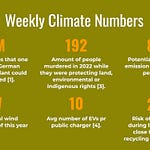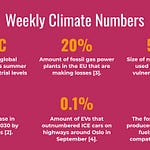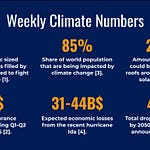Welcome to this weeks edition of The Weekly Climate! 🎉

Degrowth and Decouple (September 20, 2020) — There are two main strategies to solving the climate crisis: Degrowth or Decouple. These strategies will define and build our future. Degrowth is the strategy of “no”: As in “no, you cannot fly”, “no, you cannot eat meat” and so on. Where Decouple is the strategy of “yes but”: “Yes you can fly, but it has to be in an a green hydrogen powered airplane” and “Yes you can eat meat, but it has to be synthetic or raised using alternative cow feed”. Both strategies are valid, but are in the public debate about these things extremely tribalistic. Stop me if you’ve heard this exchange before: “Person 1: We can only stop climate change if we stop our economic growth”. Person 2: “You’re a communist”. Person 1: “You’re a techno-optimist!” and on goes the name-calling.
I may risk losing a few readers by proclaiming that we need both and both strategies are in fact extremely synergistic. In the following newsletters we will look at concrete results of following each of these strategies.
What does a future where the climate crisis is solved look like? Very different from the one we’re seeing today with rampant “extreme” weather events (which are rather normal today), melting ice sheets and threats of rising sea levels, polluting fossil fuel power plants and so on. But we actually already have items of this new world in our current world. We just need to look carefully. In fact, you very likely have one of these items in your pocket or maybe you’re holding it to read this newsletter: Your smartphone.
Think about how many devices, items and therefore consequently resources that one item replaces. It replaces your landline, your calculator, encyclopedia, many books, newspaper, CDs, typewriter, envelopes, paper, and so on. And remember it not only replaces those items, but all or much of the infrastructure that comes with those items. This is the essence of the Decouple strategy, a substitution of many physical products that each takes it toll on electricity demand, resource extraction and different kinds of pollution, with a product that is more efficient in terms of all of these parameters that makes up our ecological footprint.
Remember that the next time you take out your smartphone: You’re literally holding in your hand a piece of our decoupled future.
Meta-news: A quick update to a few changes: First of all, we have decided to stop monitor the grid issues in California as I couldn’t find any news items on that. And secondly, in the interest of shortening the newsletter slightly, I have decided to try and limit the amount of articles per section to max 3. And yes I’m going to bend those rules every now and then such as in this newsletter😛.
🏃♂️💨The quick overview
For those in a hurry here we go:
Climate & Science: Thawing permafrost reveals 40.000 year old cave bear, wildfires are release record amounts of CO2 (with some obvious differences in what gets most news coverage).
Technology: Hydro + solar is a match made in heaven with floating solar panels and the biggest Vehicle-to-Grid project launches.
Startups: Amazon’s Climate Pledge Fund has dealt out its first round of financing and one of the recipients is former Tesla CTO JB Straubels startup Redwood Materials.
Investing: More big asset manager (39 trillion €) groups starts decarbonizing their portfolio.
Major Carbon Emitters: One positive aspect of COVID19 is that it is changing our relation to our work, which just might save us a bit of CO2.
Politics: 10 years ago the UN set ambitious goals for protecting our biodiversity. How many of those do you think we reached? That’s right 0.
Climate Justice: More climate change lawsuits and a Mock Cop26 run by youth climate movements.
Other: Facebook scandalous Climate Information Center and a new book release (All you can save) showcases a new breed of feminine climate leadership.
🐢The long overview
For those who want to dive deeper, brace yourselves, the long overview is coming.
🕵️♂️Stories we follow
U.S. Presidential Election. The U.S. is a major emitter and are run by a climate sceptic and fossil fuel friendly… person. We need a change. And after Joe Biden was elected as the democratic candidate that change has to be him. Hence we keep a close watch on his climate aspirations. Trump goes against a majority of climate scientists when he says that the wildfires are due to bad forest management and not climate change. Although forest management obviously has a role, it is climate change that makes the fires more frequent and worse. In fact, I don’t even really want to go into all the weird things he says about the climate, but if you want to read them read this article. Warning: It has exploding trees in it. Also Bill McKibbens newsletter in the New Yorker goes into detail about Trumps attempts to kill all political forms of climate action. On the other side it appears that Joe Biden is putting climate action front and center in his campign.
Disclaimer about the next story about BP: I should make it absolutely clear that me bringing BP at the top of this newsletter is by no means an endorsement. In fact I believe this to be yet another fossil fuel industry scam. But if turns out not be then BP will be a model for other fossil fuel industry companies to follow, which is why it is important. And if it turns out to be scam, well then it will be used front and center once again as an example of the fossil fuel industries many lies. It’s therefore a win-win to bring it front and center here.
Better Petroleum (BPs) climate aspirations. BP has announced that it will slash oil production by 40%. If history teaches us anything it is that this will be just another load of bullcrap just like Beyond Petroleum were 20 years ago. But we will see. By putting the story up top here we aim to track it carefully. BP shocked the fossil fuel industry with it’s report claiming that oil has already peaked and will never recover. It is definitely a landmark moment in fossil fuel history that an oil major as prominent as BP does that. Following up on that in a presentation last week BPs CEO Bernard Looney explained to investors how he believes that this change in strategy will increase the companies returns to its investors. BP aims to leverage its operational experience in big infrastructure among other things to get these returns. BP aims to have 50 GW of renewable energy by 2030 (see later about the scale of this compared to what we need). However, at this columnist in Forbes claims peak oil has been predicted multiple times and it has been wrong every single time and here’s another slightly more balanced one on Oilprice.com. If he is right, then BP will probably soon be back to normal operations and this is just another scam by Beyond Petroleum. However, BP appears very bullish on peak oil is coming as it predicts in it’s recent energy outlook report that India for instance will reach peak oil soon and the follow rapidly in the footsteps of developed countries aiming to decarbonize their economies. However, Bill McKibben’s newsletter in the New Yorker (which also discussed a lot about Trump) provides the insight that the way BP is aiming to cut production of it’s fossil fuel production is to sell off assets to other companies which continue to produce fossil fuels. In that way, I think it’s fair to say that BP is not really solving the problem. It’s interesting to see how the fossil fuel industry players all react differently to their predicament they’re clearly in. A detailed analysis presented in the Washington Post last week revealed that although most have ‘going green’ aspirations, none of them, not even BP, are actually transitioning away from fossil fuels.
👩🔬Climate & Science
Quite possibly the only (and probably not worth it) benefit I’ve found of the melting permafrost is the recent discovery of an up to 40.000 year old intact extinct cave bear carcass in the melting arctic permafrost on the small Island of Bolshoy Lyakhovsky in the Russian Arctic. Indeed discoveries of ancient animal carcasses seems to be increasing as the arctic permafrost melts as a ice age lion cubs were also recently found in Yakutsk.
The wildfires on the U.S. West Coast are emitting record high amounts of CO2: 80M tons of CO2 has been emitted so far. Still the fires are dwarfed by the wildfires in the Arctic circle, which so far have emitted 244M tons. It’s interesting to see which fires gets most media attention. But California’s fire problems are truly staggering as this post reveals some key numbers such as 5B$ of property damage. Some citizens are turning to their own measures to protect their forests, bare even doing prescribed burns. One big issue with the increased amounts of wildfires is the whole idea of using trees for carbon offsets, as it was reported that a forest in Oregon built by carbon offsets went up in smoke.
Hurricane Sally which hit Florida and Alabama last week was yet another storm that underwent what’s known as “rapid intensification”, which means that the storm suddenly increases in power over a very short time as it nearing the coastline. In fact the article linked there only predicted it would go from a tropical storm to a Category 1, but it ended up being a category 2. This is one of many effects that scientists have pointed out will be prevalent in a warmer world.
🤖Technology
Hydro + solar a match made in heaven? Vattenfall is looking to expand the performance of hydropower plants by adding floating solar on top of the reservoir of water. This is a great idea as it means that the solar panels take up less area of land where it may compete with farming, bio diversity etc.
The world’s biggest Vehicle-to-Grid (V2G) project launches in the Italian region of Drosso in Miafiori. The pilot will aim to explore different ways to utilize electric vehicles as a grid resource.
What can farmers and in particular farmers that participate in the meat industry do to help the climate crisis? This excellent detailed post by The Guardian dives in. There’s a lot of interesting tech on plate, everything from regenerative agriculture to algae-based cow feed.
💡Startups
Former Tesla CTO JB Straubel battery startup, Redwood Materials, is among the first to receive funding from Amazon’s 2B$ Climate Pledge Fund. The startup aims to develop sustainable materials for battery production through circular supply chains, which captures harmful waste before it becomes an environmental problem. For instance by extracting lithium, cobalt and nickel from used smartphones.
A new web-app makes it possible for farmers to get a deeper insight into water usage of their crops. This is increasingly important in order to understand water shortages. Currently, measuring water usage by farms are difficult and complicated, so this new tool will provide farmers with an important overview.
You can now book your first trip in an electric air taxi, built by the german company Volocopter. Trips when at full scale will be around 300$, but trips today can be reserved in a presale for 30$.
💰Investing
Last week we reported that the IIGCC (Institutional Investors Group on Climate Change) a group managing 33 trillion € are pushing to decarbonize their portfolio and helping others do the same. This week another group called Climate Action 100+ managing 39 trillion € and covering 518 major investor organisations has written to 161 big emitters to demand 30 climate targets each next year. The Climate Action 100+ will then produce a report that ranks each of these 161 big emitters on those climate targets.
And related, a group of environmental organisations led Rainforest Action Network who are behind the Banking on Climate Change reports, released a brief set of “Principles for Paris-aligned Financial Institutions”. The principles offer a roadmap to decarbonization of the finance sector.
⛽️Major Carbon Emitters
Commuting to work is a big emitter and for those who take a car, a big time sink too. Now there’s no denying that the exercise you might get if you take a bike or walk is good for you, but the COVID-19 enforced lockdowns and Work-From-Home orders have made people realize that working from home is rather nice. And they’re not returning — hereby saving a lot of CO2 emissions: In fact cutting just one day from an average british commute will save 380 kg of CO2 per commute. It’s even better for the grid, because the large peaks during the evenings are now no longer seen. The reason is that people spread the energy intensive actions, like laundry and other things that they would normally do during the evenings, throughout the day.
The fossil gas industry is under increasing pressure, not only from the incredibly high amount of bankruptcies reported in the last week or the lies they are getting caught in after a recording of a meeting between fossil gas execs were leaked last week. New technology also makes it possible to track the amount of fossil gas that the fossil gas industry is leaking from their sites. And the results are not in their favour.
A new study in Nature coined a new term called “extinction denialism” which is the fact of climate change deniers attacking sound scientific reports about extinctions without the use of facts, but attacking the authors instead. The study goes into detail about the strategies and tactics that these extinction deniers are using to shed doubt about the valid scientific reports. It’s amazing to see that the climate crisis is probably more man against man, than against climate change.
🎩Politics
The UN published a report last week on the world’s attempt at reaching biodiversity goals that were agreed on in 2010. In 2010 20 targets were identified that should be improved before 2020. Not a single one of these biodiversity targets were hit.
In 2019 we deployed a record amount of solar and wind. To reach net zero by 2050 we need to deploy 6x as much as that year over year from today and until 2050. We need around 13.000 to 18.000 GW of solar and wind capacity in 2050. Which puts BPs commitment to build 50GW by 2030 in perspective. It is expected that the 13.000-18.000 GW capacity will cost around 32 trillion USD.
The president of the EU Commission revealed in her State of the Union speech last week the EU’s climate action ambitions: 55% emission reduction by 2030. Under the Paris Agreement this will be the target that countries are required to submit there plans to reach as a part of their National Determined Contribution (NDC). But it is clear that to reach that target the EU still has a long way to go.
Which countries are actually planning to go net zero carbon? This post tries to answer that. Although I can already see some minor issues like the fact that my country Denmark is mentioned, which has decided to rely on huge amounts of biomass, which is clear not in any way net zero. Still it’s a great overview of what individual countries are doing.
⚖️Climate Justice
Connecticut joins the fray of climate change lawsuits against big oil for their decades of deceit. As the press release say: “ExxonMobil knew that continuing to burn fossil fuels would have a significant impact on the environment, public health and our economy. Yet it chose to deceive the public”. In fact, 5 states have now filed similar lawsuits.
As COP26 have been delayed one year due to COVID19 young activists from Friday For Future are staging their own Mock Cop 26, which will culminate in a statement to the world’s leaders. There was and currently is not much hope that “the real” COP26 will be able to get very many results given the fact that all countries are battered by COVID19 response.
A court in Washington State is examining whether youth can sue the state for violating their rights to life and liberty due to climate inaction and fossil fuel industry support.
📦Other
Facebook’s new climate information center brings pages straight out of the fossil fuel industry playbook. As the author of the former post writes: “What Facebook is doing is akin to the National Rifle Association’s argument that the only way to stop a bad guy with a gun is a good guy with a gun. In this case, Facebook is the arms dealer handing out guns to both sides”.
Amy Westervelt did an interview with Ted Nordhaus that’s highly worth a read. Where they touch upon Ted’s work at the Breakthrough Institute, his book “Death of Environmentalism”, his work with the (in)famous Michael Shellenberger, and ecomodernism.
New book by Ayana Elizabeth Johnson & Katharine Wilkinson called “All we can save”, is out next week. The books aims to present a much needed feminine climate leadership approach to solving the climate crisis. Britt Wray wrote an excellent short review on it in her newsletter. I for one can’t wait to get it.
🎧Podcasts
Inherited — The Young and Naive: A new podcast by the amazing podcast network Critical Frequency is out. This one following stories of the youth climate movement. The first one starts at one of the epicenters: The Sunrise Movement’s legendary sit-in at Nancy Pelosi’s office.
Generation Green New Deal — The Sit-in: The second podcast to launch from Critical Frequency deals with a very similar topic: The youth generation that sparked the Green New Deal. This one will be more focussed on U.S. politics. The first episode also deals with the sit-in at Nancy Pelosi’s office and is slightly more detailed than the first one. I was really inspired by this one and how the Sunrise Movement, AOC, Rashida Tlaib managed to stage this hugely ambitious and risky sit-in.
The Interchange — The Cleantech SPAC attack: A good discussion on the recent SPAC (SPecial Acquisition Company) type IPOs which we’re seeing a lot of these days and the challenges with some of these companies. Such as the fact that many of them are pre-revenue and are usually using it mainly to raise capital. The upside then is that if they succeed they will likely be the new Teslas.
The Interchange — California’s Grab Bag of Climate Risks: We were blessed with two episodes from The Interchange folks, this one is a re-broadcast of an episode they did last year, which takes a deep dive into California’s climate risks. And it’s as relevant today as it was last year.
My Climate Journey — Ep 122: Tim Latimer, Co-founder & CEO of Fervo Energy: Jason embarks on a detailed discussion of the ups and downs of geothermal. To me this was an eye-opener as I haven’t dug very deep (pun intended) into this technology.
That’s it for this week folks! If you feel like I’m missing something, please let me know.
If you enjoyed this newsletter don’t forget to share it with your friends, coworkers or other people you think could benefit from getting it. If you got directed here by a friend or another link on the Internet don’t forget to subscribe!
See you all next week 👋











